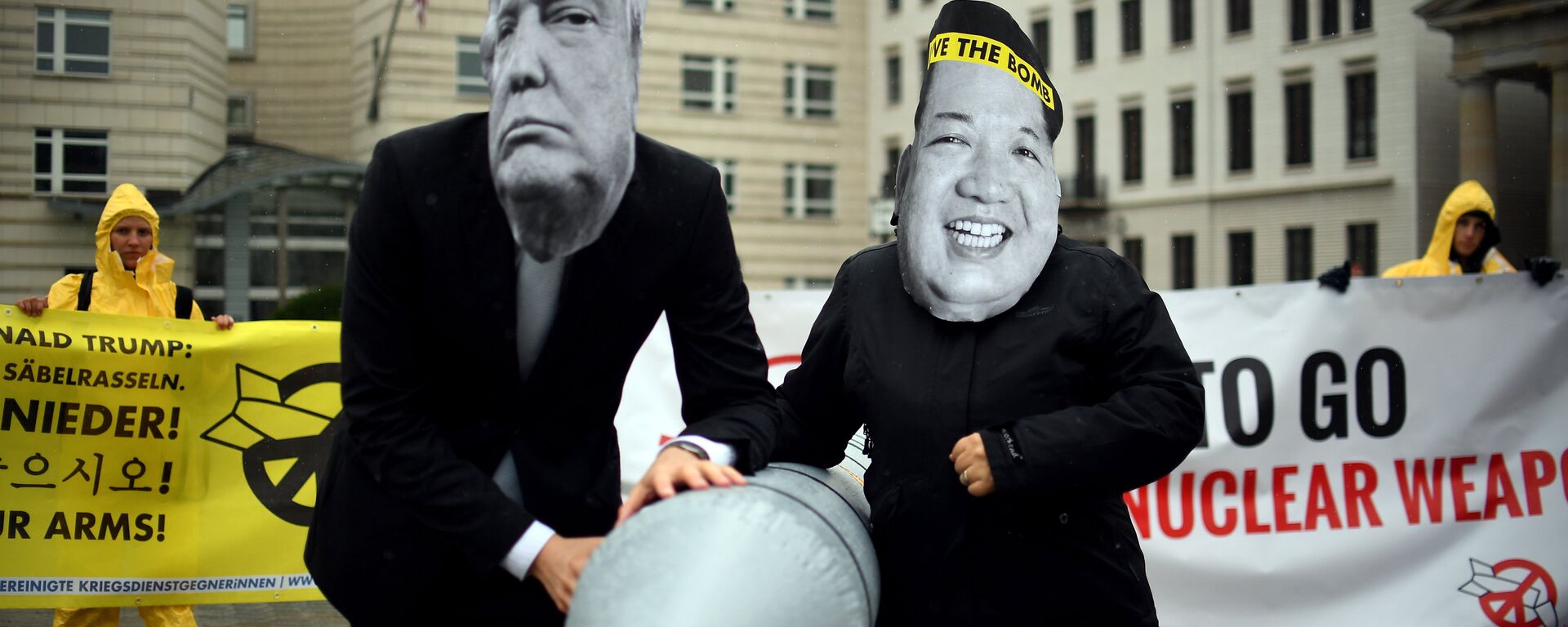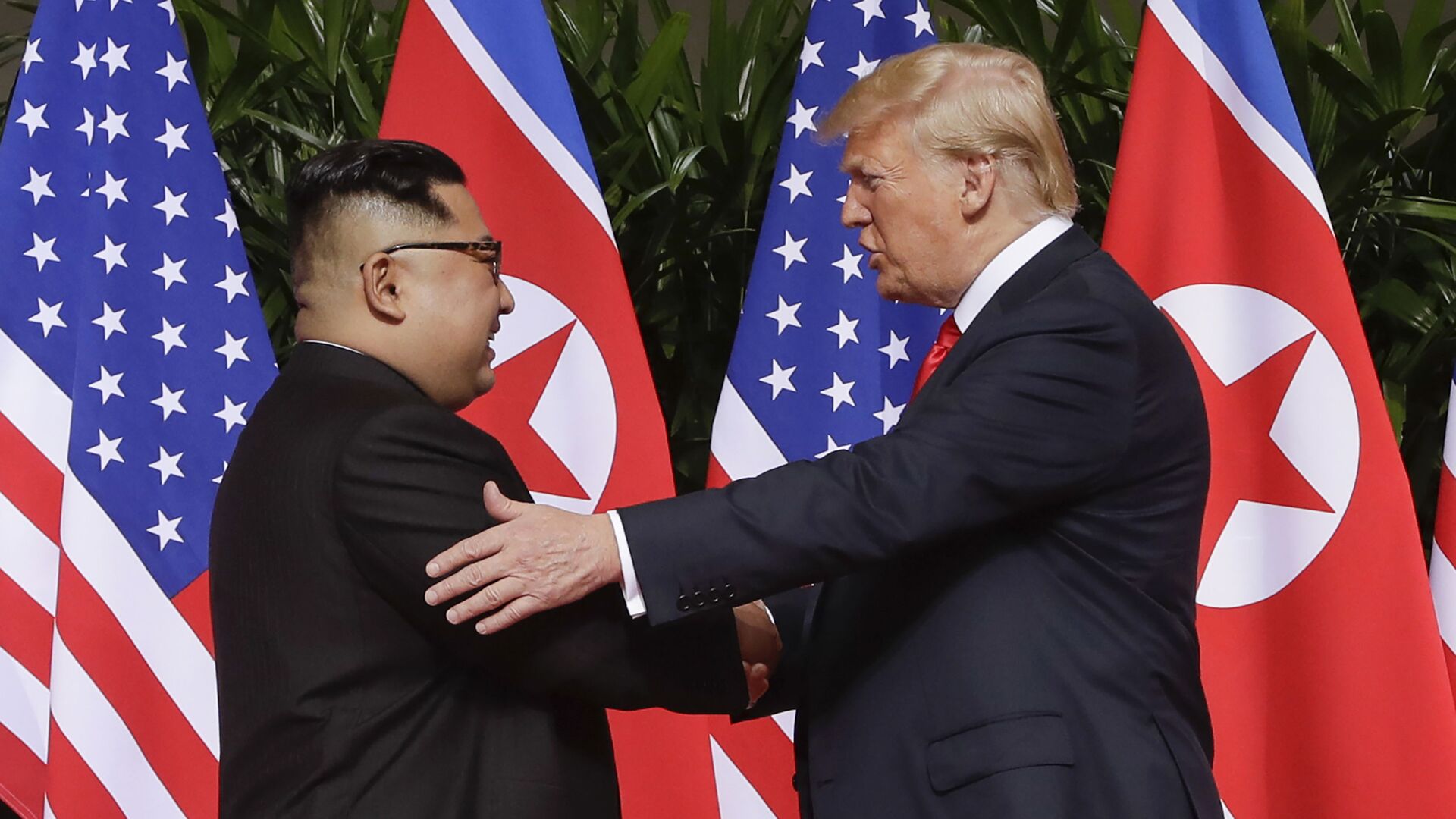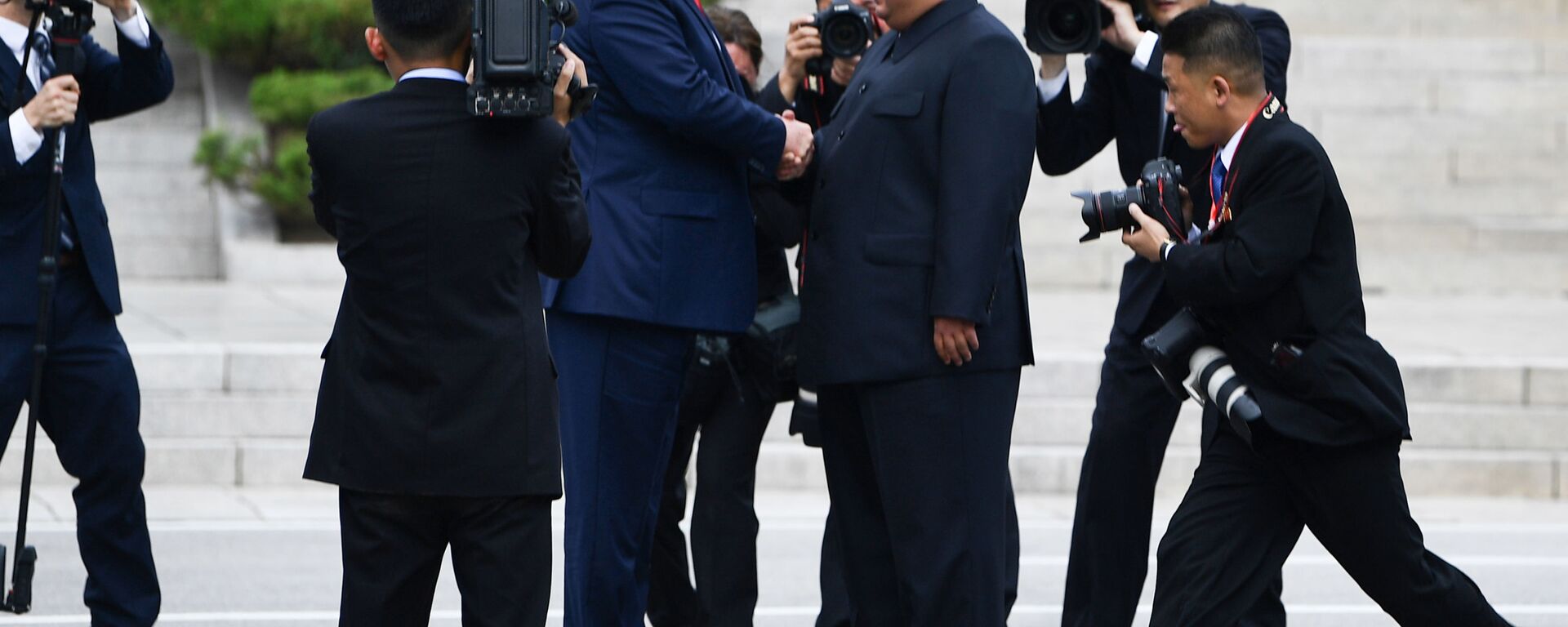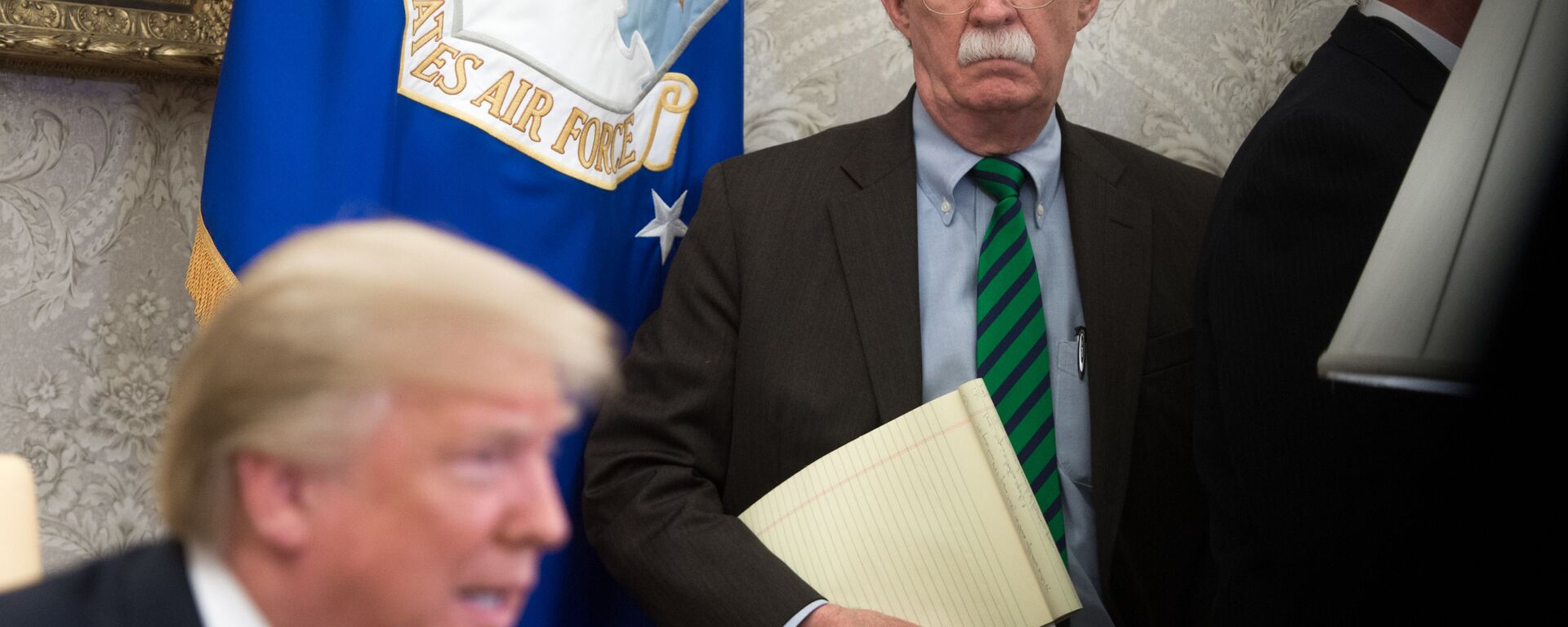https://sputnikglobe.com/20230613/trumps-north-korea-efforts-were-sabotaged-by-washingtons-unpalatable-proposals--naysaying--1111110939.html
Trump’s North Korea Efforts Were ‘Sabotaged’ by Washington’s ‘Unpalatable Proposals & Naysaying’
Trump’s North Korea Efforts Were ‘Sabotaged’ by Washington’s ‘Unpalatable Proposals & Naysaying’
Sputnik International
Donald Trump's efforts regarding North Korea during his stint in the White House were sabotaged by domestic naysaying and unpalatable for Pyongyang proposals, said Michael Madden.
2023-06-13T15:46+0000
2023-06-13T15:46+0000
2023-09-18T13:37+0000
us
donald trump
north korea
kim jong un
korean peninsula
john bolton
pyongyang
nancy pelosi
analysis
https://cdn1.img.sputnikglobe.com/img/107694/09/1076940924_0:11:3001:1699_1920x0_80_0_0_07d4cd58b0edc31aeb9babe9a3a68cb5.jpg
The stance of current POTUS, Democrat Joe Biden, regarding North Korea is a far cry from Trump’s efforts. Biden has been ratcheting up tension on the Korean peninsula. During a state visit by South Korean President Yoon Suk-yeol in April the two leaders agreed to formalize means of “deterring” North Korea. "Look, a nuclear attack by North Korea against the United States or its allies ... or partners is unacceptable and will result in the end of whatever regime to take such an action," Biden said during a press conference with Yoon. Furthermore, as part of the "Washington Declaration," Biden said the United States plans to deploy a ballistic missile submarine to the western Pacific for the first time since the 1980s. Last year, Biden said he would only agree to sit down with Kim Jong-un if he agreed to denuclearization beforehand.Washington-Pyongyang interactions dating to 2018-2019, a time when Donald Trump was POTUS, may be viewed as a “respite in the fractious relationship between the US and DPRK,” Michael Madden, Nonresident Fellow at the Stimson Center, leading contributing analyst to 38 North, told Sputnik.Madden went on to explain that the armistice agreement between the US and North Korea, can “invite a certain degree of strategic ambiguity in how one country responds to the other's acts or behavior.”'Start of 'Terrific Relationship'Back in 2015, overseeing a military parade as part of mass celebrations in Pyongyang to mark the 70th anniversary of the ruling Workers' Party, North Korea's supreme leader, Kim Jong-un said his country could defend itself from “any kind of war waged by the US imperialists.”In 2017, Trump, by then in office, also engaged in some intense rhetoric-trading after North Korea's sixth nuclear test, slamming Pyongyang’s actions as "hostile and dangerous," reaffirming Washington’s readiness to protect the US and its allies by "using the full range of diplomatic, conventional, and nuclear capabilities at our disposal." The US Navy sent its Carl Vinson Strike Group to the Korean Peninsula at the time, fueling concerns of further escalation. Trump called the North Korean leader a "Rocket Man" on a “suicide mission” during a speech at the United Nations General Assembly. Kim Jong-un was not to be outdone, saying, “I will surely and definitely tame the mentally deranged US dotard with fire," in a statement published through the DPRK's Korean Central News Agency. However, then Trump adopted a less assertive approach to North Korea, describing Kim Jong-un as "a pretty smart cookie."After nuclear brinksmanship, in a major turn of events, US President Donald Trump and North Korean leader Kim Jong-un announced they would meet in person after the North Korean leader told a South Korean envoy he was committed to denuclearization and would hold off on future nuclear weapons' tests. Donald Trump and Kim Jong-un finally met in Singapore in June 2018, shaking hands with each other for the first time, before kicking off negotiations aiming to bring complete denuclearization to the Korean Peninsula. In comments alongside North Korean leader Kim Jong-un US President Donald Trump vowed at the time that the encounter would bring a "tremendous success."In response, the North Korean leader said that despite “old prejudices and practices” working as obstacles on their way forward, they had “overcame all of them." By then, Washington had already laid out the key principles it deemed important for progress: a complete, verifiable and irreversible termination of the DPRK's nuclear program.The historic summit ended with an agreement consisting of four points: However, the next round of talks about denuclearizing the Korean Peninsula, which was held in Hanoi, Vietnam, in February 2018, abruptly ended without any agreement. The former US president walked out of the summit after apparently demanding that Pyongyang dismantle its nuclear facilities in return for sanctions relief, while North Korea wanted the sanctions to be lifted first before denuclearization could start. Looking back at that time, Donald Trump stressed in a recent US media interview that he had repeatedly tried in various ways to mend relations. But in effect, there were other actors at play. 'Sabotage From Within'Thus, then-House Speaker Nancy Pelosi organized hearings with Trump’s former personal attorney and "fixer" Michael Cohen during the Hanoi summit in 2019, and later said she was "glad" walked away from summit talks without a concrete deal. Trump's political capital for negotiations with Pyongyang was also weakened by then-national security adviser John Bolton, who sabotaged the negotiations by pushing the Republican POTUS to offer the North Korean side unacceptable demands. "Bolton advised the administration on a series of things which he knew would be considered unacceptable, almost a nonstarter, to the DPRK. When we go back to the interactions, Kim Jong-un was not putting anything on paper or on the table which had not been part of previous North Korean negotiating strategies...This was the apotheosis of Mr. Bolton's advice and why he advised a series of things which would be DOA (“dead on arrival”) when put to the North Koreans. On the other hand, had former President Trump accepted, with modifications, what the DPRK was offering then we would have had a platform and framework to at least discuss some of the things Bolton wanted, at a later point and once there was some forward progress," Madden said.Donald Trump and Kim Jong-un later met in the demilitarized zone, rekindling hopes for an improvement in ties between the two countries. That meeting - the first time a US president ever visited the border between the two Koreas. But after that all talks stalled. Looking ahead at Trump’s 2024 bid, and how his “friendship” with Kim Jong-un might affect the race, Michael Madden said that North Korea "seldom rates as a major issue on the minds of American voters in US Presidential Elections." If ex-President Donald Trump were to become elected back to office in 2024, the best way to achieve any progress in talks with North Korea would be “to bring out some small, incremental proposals,” Madden clarified.
https://sputnikglobe.com/20170916/north-korea-us-donald-trump-1057447426.html
https://sputnikglobe.com/20180612/singapore-trump-kim-summit-live-1065320147.html
https://sputnikglobe.com/20190630/us-president-trump-meets-north-koreas-kim-jong-un-at-dmz-in-historic-move-1076102697.html
https://sputnikglobe.com/20200622/laughing-matter-boltons-revelations-on-what-kim-jong-un-gets-out-of-trump-polarize-twitter-1079689608.html
north korea
korean peninsula
pyongyang
Sputnik International
feedback@sputniknews.com
+74956456601
MIA „Rossiya Segodnya“
2023
News
en_EN
Sputnik International
feedback@sputniknews.com
+74956456601
MIA „Rossiya Segodnya“
Sputnik International
feedback@sputniknews.com
+74956456601
MIA „Rossiya Segodnya“
donald trump's efforts, north korea, peace talks with north korea, sabotaged by domestic naysaying, unpalatable for pyongyang proposals, michael madden, us and dprk, north korea's nuclear tests, complete denuclearization of korean peninsula, lifting of north korea sanctions
donald trump's efforts, north korea, peace talks with north korea, sabotaged by domestic naysaying, unpalatable for pyongyang proposals, michael madden, us and dprk, north korea's nuclear tests, complete denuclearization of korean peninsula, lifting of north korea sanctions
Trump’s North Korea Efforts Were ‘Sabotaged’ by Washington’s ‘Unpalatable Proposals & Naysaying’
15:46 GMT 13.06.2023 (Updated: 13:37 GMT 18.09.2023) Donald Trump alternated between trading bellicose rhetoric and name-calling with Kim Jong-un during his stint in the White House, dubbing the North Korean leader “Rocket Man” in 2017, to claiming the two had “good chemistry,” but, nevertheless, 45th POTUS made some unprecedented overtures to Pyongyang, meeting with Kim three times during his term.
The stance of current POTUS, Democrat Joe Biden, regarding North Korea is a far cry from Trump’s efforts. Biden has been ratcheting up tension on the Korean peninsula. During a state visit by South Korean President Yoon Suk-yeol in April the two leaders agreed to formalize means of “deterring” North Korea. "Look, a nuclear attack by North Korea against the United States or its allies ... or partners is unacceptable and will result in the end of whatever regime to take such an action," Biden said during a press conference with Yoon.
Furthermore, as part of the "Washington Declaration," Biden said the United States plans to deploy a ballistic missile submarine to the western Pacific for the first time since the 1980s. Last year, Biden said he would only agree to sit down with Kim Jong-un if he agreed to denuclearization beforehand.
Washington-Pyongyang interactions dating to 2018-2019, a time when Donald Trump was POTUS, may be viewed as a “respite in the fractious relationship between the US and DPRK,” Michael Madden, Nonresident Fellow at the Stimson Center, leading contributing analyst to 38 North, told Sputnik.
“We can look at this time period and the leadership summit meetings as a bit of diplomatic creativity. There are obdurate perspectives on US-DPRK relations in both Pyongyang and Washington, and given North Korean decisions on weapons development and the US' responses to them it can be argued it has become a "chicken or the egg" scenario, at least going back to 2015,” the director and founder of NK Leadership Watch stated.
Madden went on to explain that the armistice agreement between the US and North Korea, can “invite a certain degree of strategic ambiguity in how one country responds to the other's acts or behavior.”

16 September 2017, 10:28 GMT
'Start of 'Terrific Relationship'
Back in 2015, overseeing a military parade as part of mass celebrations in Pyongyang to mark the 70th anniversary of the ruling Workers' Party, North Korea's supreme leader, Kim Jong-un said his country could defend itself from “any kind of war waged by the US imperialists.”
In 2017, Trump, by then in office, also engaged in some intense rhetoric-trading after North Korea's sixth nuclear test, slamming Pyongyang’s actions as "hostile and dangerous," reaffirming Washington’s readiness to protect the US and its allies by "using the full range of diplomatic, conventional, and nuclear capabilities at our disposal." The US Navy sent its Carl Vinson Strike Group to the Korean Peninsula at the time, fueling concerns of further escalation. Trump called the North Korean leader a "Rocket Man" on a “suicide mission” during a speech at the United Nations General Assembly. Kim Jong-un was not to be outdone, saying, “I will surely and definitely tame the mentally deranged US dotard with fire," in a statement published through the DPRK's Korean Central News Agency. However, then Trump adopted a less assertive approach to North Korea, describing Kim Jong-un as "a pretty smart cookie."
After nuclear brinksmanship, in a major turn of events, US President Donald Trump and North Korean leader Kim Jong-un announced they
would meet in person after the North Korean leader told a South Korean envoy he was committed to denuclearization and would hold off on future nuclear weapons' tests. Donald Trump and Kim Jong-un finally met in Singapore in June 2018, shaking hands with each other for the first time, before kicking off negotiations aiming to bring complete denuclearization to the Korean Peninsula. In comments alongside North Korean leader Kim Jong-un US President Donald Trump vowed at the time that the encounter would bring a "tremendous success."
"We are going to have a great discussion. It's gonna be a tremendous success. We will have a terrific relation," Trump said.
In response, the North Korean leader said that despite “old prejudices and practices” working as obstacles on their way forward, they had “overcame all of them." By then, Washington had already laid out the key principles it deemed important for progress: a complete, verifiable and irreversible termination of the DPRK's nuclear program.
The historic summit ended with an agreement consisting of four points:
1.
the agreement to establish new bilateral relations;
2.
the decision to join efforts to "
build a lasting and stable peace regime on the Korean Peninsula;"
3.
Pyongyang's confirmation of commitment to denuclearization;
4.
and the repatriation of the remains of US military personnel, either prisoners of war or missing in action, from the 1950 to 1953 war.
However, the next round of talks about denuclearizing the Korean Peninsula, which was held in Hanoi, Vietnam, in February 2018, abruptly ended without any agreement. The former US president walked out of the summit after apparently demanding that Pyongyang dismantle its nuclear facilities in return for sanctions relief, while North Korea
wanted the sanctions to be lifted first before denuclearization could start. Looking back at that time, Donald Trump stressed in a recent US media interview that he had repeatedly tried in various ways to mend relations. But in effect, there were other actors at play.
Thus, then-House Speaker Nancy Pelosi organized hearings with Trump’s former personal attorney and "fixer" Michael Cohen during the Hanoi summit in 2019, and later said she was "glad" walked away from summit talks without a concrete deal.
"Pelosi's hearings aside, there was a lot of domestic noise and opposition from influential elites in both parties about Trump's willingness to engage Kim Jong-un," said Michael Madden.
Trump's political capital for negotiations with Pyongyang was also weakened by then-national security adviser John Bolton, who sabotaged the negotiations by pushing the Republican POTUS to offer the North Korean side unacceptable demands.
"Bolton advised the administration on a series of things which he knew would be considered unacceptable, almost a nonstarter, to the DPRK. When we go back to the interactions, Kim Jong-un was not putting anything on paper or on the table which had not been part of previous North Korean negotiating strategies...This was the apotheosis of Mr. Bolton's advice and why he advised a series of things which would be DOA (“dead on arrival”) when put to the North Koreans. On the other hand, had former President Trump accepted, with modifications, what the DPRK was offering then we would have had a platform and framework to at least discuss some of the things Bolton wanted, at a later point and once there was some forward progress," Madden said.
Donald Trump and Kim Jong-un later met in the demilitarized zone, rekindling hopes for an improvement in ties between the two countries. That meeting - the first time a US president ever visited the border between the two Koreas. But after that all talks stalled.
“Looking back on 2018-2019, there was a possibility of reaching a very basic, almost skeletal, process that ended in normalization. Practically this would have taken 5-10 years given logistics, scheduling interactions, bureaucracy, etc.,” Michael Madden believed.
Looking ahead at Trump’s 2024 bid, and how his “friendship” with Kim Jong-un might affect the race, Michael Madden said that North Korea "seldom rates as a major issue on the minds of American voters in US Presidential Elections." If ex-President Donald Trump were to become elected back to office in 2024, the best way to achieve any progress in talks with North Korea would be “to bring out some small, incremental proposals,” Madden clarified.
“Very simple points of cooperation and exchange. This would mitigate, or at least stifle, domestic naysaying and prove palatable to Pyongyang,” Michael Madden said.






